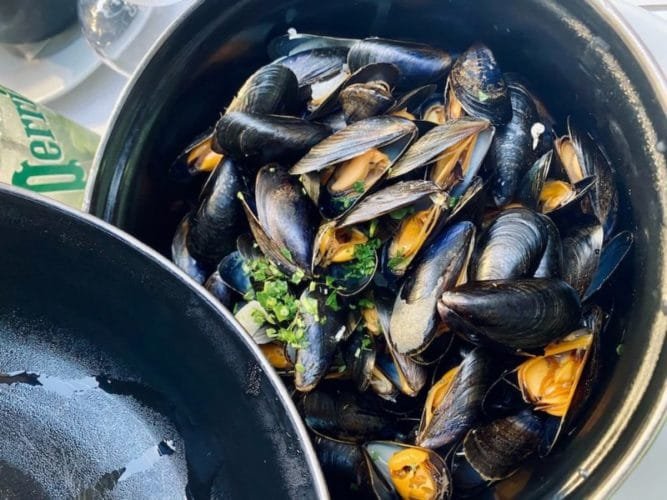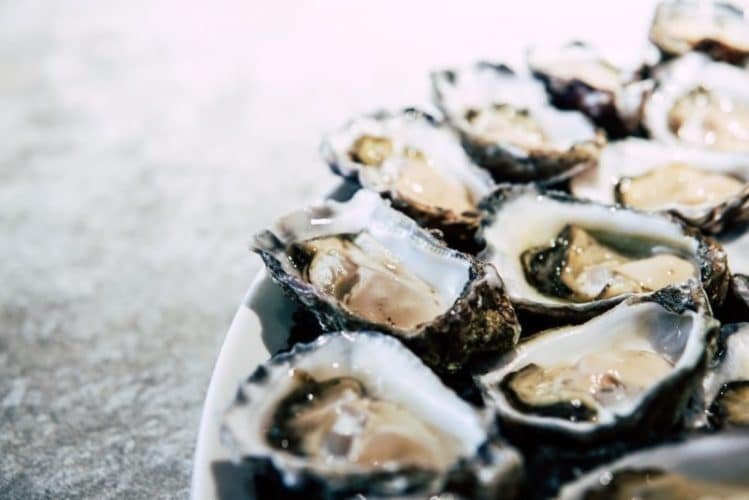How To Freeze Shellfish
Professionals advise that there is no blanket rule when it comes to shellfish and freezing. You have to treat each type of shellfish slightly differently and each one will have a slightly different method.
We would advise that you think about freezing shellfish before doing so. It might be a better option to eat it when it is fresh rather than to risk freezing it and getting it wrong.
However, we will take a look at the common types of shellfish and how you might freeze them.
How to Freeze Mussels
You can buy mussels already frozen so yes, of course, you can freeze mussels! However, be careful if you attempt this at home, it can be very easy to get it wrong.
- Clean
Rinse fresh mussels thoroughly to get rid of the sand in them. - Steam
Steam the mussels over a medium heat to get the shells to open. You will need to shuck the mussels to open them fully and drain any liquid inside the mussels. - Store
Once the mussels are prepared, pop them into an airtight freezer container. - Seal
Pour over a solution of brine and then seal the container fully. - Freeze
Label with the date and contents and then pop the mussels into the freezer.

How to Freeze Clams
You can freeze clams in much the same way you would freeze mussels. So follow the same method outlined above for mussels. As with all shellfish, make sure you take care to only freeze the best quality clams and throw any away that smell bad or seem like they might be spoiling.
How to Freeze Lobster
You can freeze lobster but you do need to cook the lobster first to stop it from spoiling.
- Cook
Cook the lobster in saltwater for approximately 8 minutes. Drain and allow the lobster to cool completely. - Place into a Bag
Put the lobster into a freezer bag. Add some brine and seal the bag tightly. - Freeze
Pop this into the freezer and freeze.
How to Freeze Cockles
Cockles are a type of shellfish you need to take extra care with.
As soon as the cockle dies it starts to spoil immediately. This allows harmful bacterias to grow straight away and this is why shellfish can cause sickness so easily.
If you have fresh cockles that you are confident have only just died then you can freeze them but you should only do so if you know the cockle has died within the last thirty minutes.
To freeze follow this method.
- Clean
Before you freeze you will need to clean and prepare the cockles properly. Wash the cockles for thirty minutes under running water. This removes a lot of the sand, dirt and debris. - Purge
Next, fill a bowl or sink with salt water and place the cockles into it for two hours. The salt helps to draw out any toxins and debris from inside the shell. If they still seem like they are dirty then you can leave them for up to about six hours. Pop this bowl into the fridge while the cockles are sitting and purging the debris in them. - Filter
Next, go through your cockles and select the best quality ones. Any that show signs of spoiling, have algae growing on them, the shells are open or the shell is broken should be thrown away immediately. - Cook
Cook the cockles in a saucepan on a low heat with a little water. Once the shells start to open you can drain them. - Store
Put the cockles into an airtight container and seal it tightly. - Freeze
Pop this into the freezer.
3 Tips for Freezing Shellfish
Now you know how to freeze it, we’ve got our 3 top tips which we strongly recommend following when freezing shellfish to have the best results:
- Be Careful – Shellfish can go bad easily. If you don’t freeze it properly then there is a risk that harmful bacteria will form and you’ll make yourself ill. So be careful! This applies to all shellfish from oysters to scallops.
- Never Refreeze Shellfish – As stated above, shellfish can be temperamental so avoid refreezing it as this is when bacteria can grow easily.
- Label the Type – If you have frozen multiple types of shellfish then make sure you label them clearly so you easily distinguish what is in the freezer.
How Long Can You Freeze Shellfish?
All shellfish is slightly different so make sure you look up how to look after the shellfish you have. As a general rule of thumb, you should be able to freeze shellfish that has been prepped and frozen properly for between two to three months.
The sooner you eat the fish the better to avoid any of it spoiling. This will also ensure that the shellfish tastes as good as it possibly can.
You Can Freeze Shellfish for Around 3 Months
How Do You Defrost Shellfish?
Defrosting shellfish is almost as tricky as it is to freeze it in the first place! Shellfish is extremely perishable and starts to degrade and spoil as soon as it thaws out. To avoid bacteria growth you should defrost it in the fridge.
Simply take the shellfish out of the freezer and pop it into the fridge to defrost.
You will need to eat it as soon as it has fully defrosted and always keep it in the fridge until it is time to cook and eat it. As you are getting ready to eat the shellfish watch out for signs of spoiling and degradation.
If there are any signs or smells that seem like the shellfish may not be good anymore then throw it out rather than taking the risk.
Can You Refreeze Shellfish?
No, you should definitely not refreeze shellfish.
As we have mentioned throughout this article shellfish is highly perishable and it spoils easily and almost immediately after it has been caught.
Freezing shellfish once can be difficult and the shellfish wouldn’t survive the process more than once without causing bacteria growth that would be harmful to you.
If in doubt then always throw out your shellfish rather than take the risk.
Does Shellfish Freeze Well?
Shellfish aren’t a food that freezes well. This is the case for nearly all fish, unfortunately from crab to mussels. They can be frozen successfully but they will never taste as good frozen as they did fresh.
This is because the flesh starts to degrade as soon as they are caught and the meat of the shellfish is also fairly delicate and doesn’t survive freezing well.
However, you can still freeze and enjoy shellfish as long as you are happy to accept this difference.
Related FAQs
If you’ve still got questions about freezing shellfish or shellfish in general, then these may help:
Can You Freeze Oysters?
Oysters, like most shellfish, can be frozen. But that doesn’t mean you should. Again, it is easy to get wrong and that made lead to you freezing spoiled oysters. When you come to eat them they will, at best, taste a bit dodgy and, at worst, make you incredibly sick.

Can You Freeze Shellfish Stock?
It does seem like it’s all bad news when it comes to freezing shellfish. But no more. Shellfish stock is something you can freeze. Like most stocks, you have two options. You can either freeze it as a normal, liquid stock in thick freezer bags.
Or you can reduce the stock down further than you normally would and create an incredibly strong stock concentrate which can then be frozen in cubes using an ice cube tray. The latter of these two methods will take us less room in the freezer and is easier to use.


